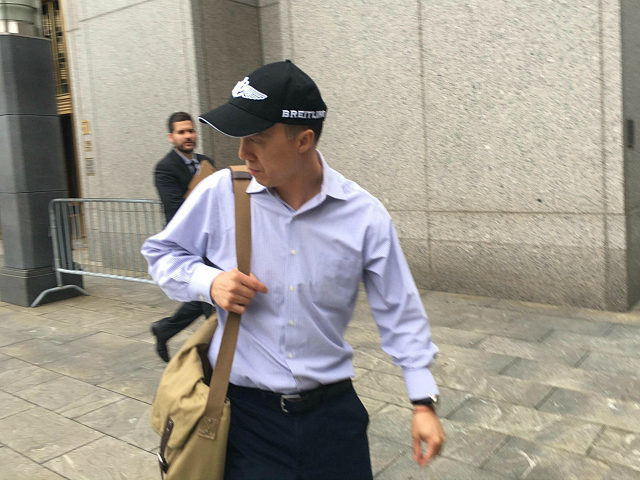Six people were arrested across the country Tuesday in a roundup of a corporate spy ring passing military-applicable technology to a Chinese Company, the latest in a wave of arrests over Chinese theft of American private sector innovation.
The alleged espionage conspiracy involved the theft from an unnamed Houston, Texas company and delivery to a Chinese state-owned firm of production techniques for a high-tech “syntactic foam” used in the maritime and aerospace industries. According to the Department of Justice press release, the foam has significant military applications, including in building submarines.
On Wednesday, conspiracy to commit theft of trade secrets charges were handed down in the U.S. District Court for the District of Columbia for Shan Shi, Uka Kalu Uche, born in Nigeria; Samuel Abotar Ogoe, born in Ghana; and Johnny Wade Randall, all US citizens, as well as Canadian Kui Bo and Chinese citizen Gang Liu. All had been residing in the Houston, TX-area. Ogoe, Uche, and Randall appear to have been arrested there, Shi and Liu in the District of Columbia, Bo in Massachusetts.
A seventh member of the alleged conspiracy is Hui Huang, an employee of the Chinese recipient of the trade secrets believed to be in China.
The supporting affidavit of FBI Special Agent Roman Rozhavsky cites the Chinese Communist Party’s 13th five-year plan and 2015 Chinese government white paper calling for the development of marine engineering technology in order to become a major marine power. The Chinese state-owned enterprise which is alleged to have received the stolen information on the manufacture of syntactic foam was set up in pursuit of those goals.
According to the same affidavit, the Chinese state-owned manufacturing firm, Taizhou CBM Future New Material Science and Technology, assigned defendant Shan Shi to set up and become president of a subsidiary, “CBMI,” in Houston near the unnamed American manufacturer of the syntactic foam. At great expense, CBMI hired Ogoe and Liu, former employees of the American firm, and Bo in 2014 with the specific goal of appropriating that company’s foam technology. Using their knowledge of the industry and experience with the American firm’s operations, these conspirators enlisted the help of Randell and Uche, who still worked at the American company, to pass trade secret after trade secret after trade secret to CBMI, where they were promptly sent back to the communist Chinese parent.
In 2015, according to the affidavit, the Chinese set up factories in China using the stolen technology and undercutting the American firm’s prices. For their troubles, the alleged conspirators had millions of dollars wired to them from the Chinese parent.
In an alleged dinner conversation, Shan Shi, the President of the operation, brazenly recounted his company’s success to an American who then told the FBI:
In all aspects, China has no own innovations; that’s why theirs are much cheaper. They save lots on research money because it will be so costly in the beginning. The first model will cost so much. Just to take a look at it, China will understand it immediately and will not do research by themselves. The U.S., for example, is like a locomotive, driving its own train, selling tickets and showing others around. China will either pay to ride in that train or drive its own train.
The alleged conspirators, now in custody, face ten years in federal prison for each instance of trade secret theft.
This Houston conspiracy, however, is not the first this month involving Chinese efforts to appropriate American industrial know-how. Also on Tuesday, Si “Cathy” Chen was arrested by U.S. Immigration and Customs Enforcement’s Homeland Security Investigations in Pomona California, and is now charged with shipping sensitive technology with military applications back to her native mainland China for over two years. Under the International Emergency Economic Powers Act, many kinds of high-tech American devices may not be sent to China for fear they can be reverse engineered and used to bolster their military effectiveness.
In this case, Chen is alleged to have shipped dozens of cutting-edge radio transmission and digital-to-analog conversion components with potential use in military guidance and radio jamming application. Chinese firms operating in the United States would purchase the components explicitly for use within the United States. They would then send them to Chen in Pomona, who would in turn ship them to Hong Kong or mainland China, listing them in customs documents as low-value uncontrolled electronics. In return, money from China was wired to Chen’s accounts in the United States.
“Federal export laws are designed to protect American interests by preventing the proliferation of technology that may fall into the wrong hands,” said Acting United States Attorney for the Central District of California Sandra Brown. “We will vigorously pursue those who traffic items that could harm our national security if they land in the wrong hands.”
Chen also faces money laundering and immigration charges and, if convicted of all 14 of the pending charges against her, could theoretically receive 150 years in federal prison.
Last Friday, yet another Chinese national, Xu Jiaqiang, was convicted in his espionage case in White Plains, New York. Xu pleaded guilty to violations of the Economic Espionage Act. He stole sourcecode from his American employer and transferred it to parties in mainland China for payoffs. Xu will face up 75 years in prison when he is sentenced in October.
These three cases represent the latest in federal efforts to stem the flood of communist China’s determined and state-sponsored operations to extract information from the American public and private-sectors. Last year, these efforts even discovered a Chinese spy at the FBI itself.

COMMENTS
Please let us know if you're having issues with commenting.